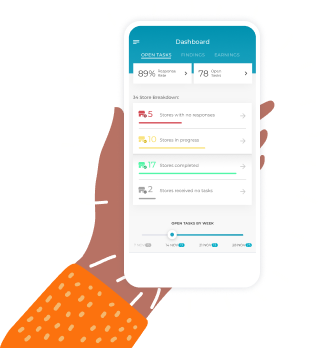As traditional retailers take stock of the marketplace in 2019, it’s beginning to appear as though fears of a full-blown “retail apocalypse” were exaggerated. Today, upwards of 90 percent of all retail sales are still completed in physical stores, and industries such as home furnishings, automotive and beauty supplies maintain low percentages of e-commerce sales vs. in-store purchases.
What was touted as apocalypse Armageddon, instead, looks more like an evolution, as retailers big and small begin to figure out how to apply the built-in advantages of e-commerce—from personalization to frictionless payments to an endless pipeline of new products—to the in-store shopping experience. It’s an essential bid to cater to a growing range of customers, whose needs are growing evermore complex.
Retailers across a range of industries are beginning to act more like tech companies. For some, this means turning to in-house retail incubator programs to help identify, invest in, and nurture a wide range of products and startups that reduce operational inefficiencies and transform the customer experience. They’re aiming to bring on board, at an early stage, what would otherwise be potentially costly third-party innovations. In return, the startups selected gain access to the retailer’s vast industry resources and expertise.
Here’s a look at how five large retailers are leveraging accelerator programs to help them define the future of retail.
Target/METRO Retail Accelerator, Certified by Techstars
The eighth-largest retailer in the United States is adding to its suite of accelerator programs in 2019 with the creation of the new Target Incubator program, aimed at growing business ideas that are “better for people” or “better for the planet.” That’s in addition to the more-established Target Retail Accelerator, Certified by Techstars.
Now in its fourth year, the accelerator program is taking on an international flavor as Target is teaming up with the German retailer METRO AG to cast a world-wide net for new technology in the realm of chatbots, inventory management, autonomous vehicles, customer insights and machine learning. CB4 is proud to be one of the nine global startups selected for the latest cohort.
In 2018, six of the nine startups participating in the Target Retail Accelerator were invited to participate in in-store pilot programs. Among those are Satisfi Labs, a software provider that helps brands provide real-time answers to consumers, and Runerra, a app that makes it easy for shoppers to run errands for neighbors at local stores. The fact that a large share of participating startups advanced to pilot stage illustrates how important the accelerator programs are to Target’s evolving retail experience.
Foot Locker’s Greenhouse
Foot Locker has historically been a seller of other vendor’s goods. Nike products alone account for nearly 70 percent of the company’s sales. But a down year for Nike in 2017 hurt Foot Locker’s bottom line, too, and led the footwear and apparel giant to seek to diversify its offerings.
The solution: Greenhouse, Foot Locker’s in-house incubator program, which is intended to give the footwear retailer early access to a whole slew of emerging product categories—and not only footwear. Foot Locker has invested more than $140 million in established startups since the beginning of 2018, but its latest move is geared toward aligning with emerging brands earlier in the product development cycle. Doing so could make it easier to spot and respond to consumer trends more quickly—and offer a differentiated product lineup in the all-things-at-all-times age of Amazon.
Foot Locker plans to release an e-commerce platform specifically to showcase products made by Greenhouse startups—a showroom for exclusive products that are designed to capture customer attention in ways a whole catalogue of wholesale big-brand sneakers cannot.
Kroger’s Zero Hunger Zero Waste Innovation Fund
U.S. consumers, businesses and farms annually spend more than $200 billion on food that’s never eaten, and grocery stores are at the center of the issue. But Kroger, one of the world’s largest grocery chains, has made it a top priority to eliminate food waste across its stores by 2025. And it’s investing heavily in tech startups to help achieve its goal.
Kroger’s Zero Hunger Zero Waste Innovation fund provides grants of up to $250,000 for entrepreneurs working on emerging technology projects geared toward eliminating food waste. One such company whose products are already on Kroger shelves is Apeel, makers of an edible coating that can be applied to produce, such as avocados, to reduce evaporation and prolong shelf life, thereby reducing food waste.
L’Oréal’s Open Innovation
L’Oréal is a giant in the world of beauty products. But scale can be an obstacle for large retailers when it comes to adjusting to rapidly changing tastes and customer demand—a constant in the beauty game. This is where L’Oréal turns to its Open Innovation incubator program for bleeding-edge beauty products, devices and digital services.
Through partnerships with accelerator campuses in Paris and London, and funding from the Silicon Valley-based Partech Ventures, L’Oréal has the connections and resources to identify growth-stage beauty companies and give them the resources they need to mature. Early success stories include a startup called Sampler, a platform that helps beauty manufacturers target samples of beauty products to hyper-specific audiences, and Tailify, a marketplace that connects beauty brands with content creators. For more on L’Oréal’s innovations, check out “L’Oréal’s Tech Arsenal: How the Legacy Brand Stays on Top.”
Walmart Store No. 8
Walmart takes a two-pronged approach toward in-house innovation. It uses its Walmart Labs retail incubator to focus on immediate customer-facing needs. For longer-term thinking, there’s Store No. 8, and its lofty mandate of “transforming the future of retail.”
Launched in 2017, Store No. 8 is aggressively looking for big-leap solutions to retail problems, like streamlining conversational commerce and adopting scalable virtual reality technology that can give customers simulated first-person experiences with in-store products and services. For the former, there’s Jetblack, a just-out-of-beta text-based shopping service and recommendation engine. For the latter, there’s Spatial&, a “V-commerce” company that could one day help customers not only look at a kayak in an in-store display, but take it out on a virtual river.
Among Store No. 8’s most recent breakthroughs: InHome, Walmart’s store-to-fridge delivery service—and answer to Amazon’s own in-home delivery services—that is scheduled to launch this fall in Pittsburgh, Kansas City and Vero Beach.
Chances Worth Taking
Whether it’s in-store virtual reality, an edible coating to preserve shelf life in produce or a platform to distribute beauty samples, the fickle reality of retail tech is that many innovations will fail to prove durable enough to transform the landscape. That’s a high bar, yes, but it underscores the absolute necessity of experimentation and investment in new ideas, and the value of casting a wide variety of bets on what might be the next big thing.
Retail incubator programs are especially important for legacy brands, which can be prone to conservatism when it comes to innovation. As retailers like Foot Locker and Target take stock of the landscape and seek a competitive edge, it’s clear that retail incubator programs can play an important role in unearthing new terrain and allowing them to handpick innovations to suit their organization’s biggest obstacles. They can also help retailers have a hand in influencing the retail technology of tomorrow.
CB4 is excited to be one of nine retailers, selected from hundreds, to participate in the Target/METRO Accelerator. Learn more about what we bring to the table or watch this video to learn how our AI tool works in stores.



